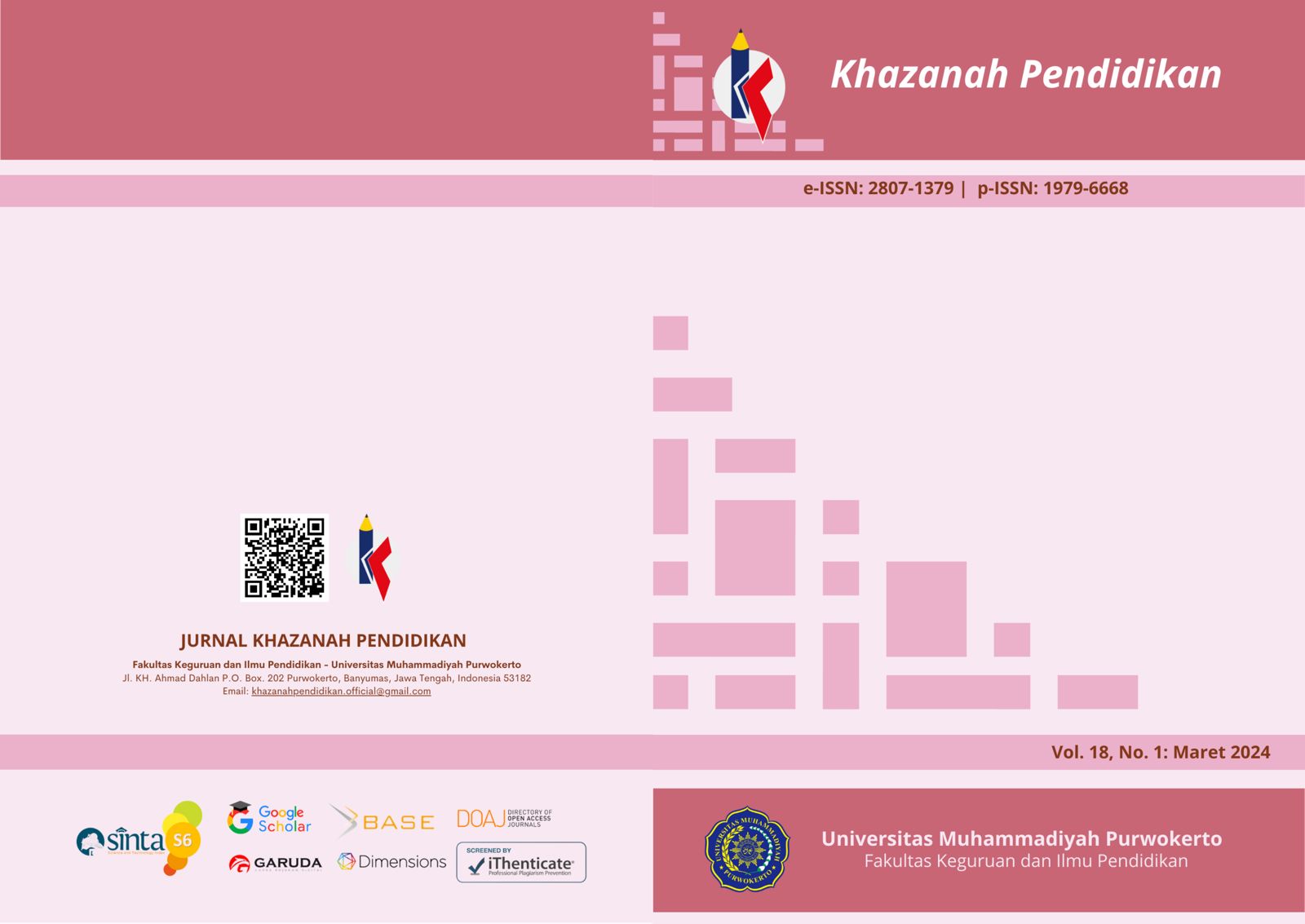IMPLEMENTASI KARAKTER PROFIL PELAJAR PANCASILA DALAM PEMBELAJARAN MATEMATIKA SMK BERBASIS TPACK
DOI:
https://doi.org/10.30595/jkp.v18i1.21457Keywords:
Pelajar Pancasila, Pendidikan Karakter, TPACKAbstract
The Indonesian nation has Pancasila, Pancasila is a national character which now among students of the millennial generation has begun to fade the awareness to live it. Starting from the first to the fifth precepts, all of them cover various lines of life lived by humans, therefore, we should reaffirm this national identity, through Pancasila. which is integrated in the TPACK-based mathematics subject at SMK Negeri 1 Karanggayam, Kebumen Regency, both in planning, implementation and evaluation, program influence and factors related to character education strengthening programs that are integrated in mathematics subjects at SMK Negeri 1 Karanggayam, Kebumen Regency. Research this has been done using the type of library research (library research). The source used is scientific literature in the form of books, journals, scientific articles related to research topics. Next, the data were analyzed using the content analysis method. The profile of Pancasila students is the character and abilities that are built in     daily life and lived in students through the culture of the education unit, intracurricular, projects to strengthen the profile of Pancasila students, and extracurriculars. The Pancasila Student Strengthening Project is an interdisciplinary project. The project at SMK Negeri 1 Karanggayam carries the theme Engineering and technology with the sub-theme of ethics in digital media in the odd semester of 2022. Awareness about using the internet properly emerges as educational material for students so that each student can maintain their attitude, behavior and interactions in social media ÂReferences
BSKAP. (2022). Keputusan Kepala Badan Standar Kurikulum dan asesmen Pendidikan, Kementerian Pendidikan Riset dan Teknologi No 33.
Harahap, D. A., Nasution, W. N. A., & Nasution, S.M. (2019). Pelatihan Peningkatan Kemampuan Guru dengan Berbasis TIK (e-modul serta camtasia video) di SMAN 2 Tanjungbalai. Jurnal Anadara Pengabdian Kepada Masyarakat, 1 (2), 113-119. http://www.jurnal.una.ac.id/index.php/anadara/article/view/994
Hariati, H., Ilyas, M. I. M., & Siddik, M. (2022). Analisis Pembelajaran Daring Di Masa Pandemi Covid-19 Pada Kemampuan Technological Pedagogical And Content Knowledge (TPACK) Guru Sekolah Dasar. Journal of Instructional and Development Researches, 2(1), 32-47. https://www.journal.iel-education.org/index.php/JIDeR/article/view/119
Irawan, M. A., & Faqih, M. (2014). Implementasi Manajemen Strategik Pendidikan Karakter Di SMP N 2 Mataram. Jurnal Paedagogy, 1(1), 8-16. http://e- journal.undikma.ac.id/index.php/pedagogy/article/view/3054
Kamil, D., Jamin, A., Yusuf, M., & Harahap, S. B. (2021). Efikasi Diri Guru SMP dalam Pengintegrasian Pendidikan Karakter Pada Pembelajaran Kurikulum 2013. Jurnal Pendidikan Karakter, 12(2), 250-264. https://journal.uny.ac.id/index.php/jpka/article/view/42310
Nisa', F., Hanifa, R., & Supratman, Y. B. (2021). Hubungan Mata Pelajaran Pancasila Di Sekolah Terhadap Penerapan Implementasi Pancasila Pada Pelajar. Jurnal Pancasila dan Bela Negara, 1(1), 33-42. http://jurnal.upnyk.ac.id/index.php/jpbn/article/view/4435
Lickona, T. (2013). Educating for Character, Mendidik Untuk Membentuk Karakter. terjemahan Juma Abdu Wamaungo. In Jakarta: Bumi Aksara.
Maya, R. (2013). Esensi Guru dalam Visi-Misi Pendidikan Karakter. Edukasi Islami: Jurnal Pendidikan Islam, 03(02).
Mewangi, R. (2004). Pendidikan Karakter Solusi Yang Tepat Untuk Membangun Bangsa. Jakarta : Indonesia Heritage Foundation.
Mishra, P., & Koehler, M.J. (2006). Technological Pedagogical Content Knowledge: A Framework For Teacher Knowledge. Teachers College Record, 108,1017-1054.
Nugroho, S. S., Anam, M. C., Pudjiono, M. J., Rahardjo, M., & Sukarjono, B. (2020). Implementasi Konsep Pendidikan Karakter Ki Hajar Dewantara Berbasis Nilai-Nilai Pancasila Bagi Mahasiswa Generasi Mileneal. YUSTISIA MERDEKA : Jurnal Ilmiah Hukum, 6(2). https://doi.org/10.33319/yume.v6i2.61
Perdana, D. R., & Adha, M. M. (2020). Implementasi Blended Learning Untuk Penguatan Pendidikan Karakter Pada Pembelajaran Pendidikan Kewarganegaraan. Citizenship Jurnal Pancasila Dan Kewarganegaraan, 8(2), 90-101. http://e- journal.unipma.ac.id/index.php/citizenship/article/view/6168
Rusnaini, R., Raharjo, R., Suryaningsih, A., & Noventari, W. (2021). Intensifikasi Profil Pelajar Pancasila Dan Implikasinya Terhadap Ketahanan Pribadi Siswa. Jurnal Ketahanan Nasional, 27(2), 230-249.https://journal.ugm.ac.id/jkn/article/view/67613
Shalikha, P.A.A. (2022) Implementasi Projek Penguatan Profil Pelajar Pancasila Sebagai Upaya Menumbuhkan Jiwa Kewirausahaan. Jurnal Pendidikan Ekonomi, 15(2),86-93
Sholihah, D. A. (2021). Pendidikan Merdeka dalam Perspektif Ki Hadjar Dewantara dan Relevansinya Terhadap Merdeka Belajar di Indonesia Dyahsih Alin Sholihah. Jurnal Literasi, 12(2), 115-122.
Suriadi, H. J., Firman, F., & Ahmad, R. (2021). Analisis Problema Pembelajaran Daring Terhadap Pendidikan Karakter Peserta Didik. Edukatif: Jurnal Ilmu Pendidikan, 3(1), 165-173. https://www.edukatif.org/index.php/edukatif/article/view/251
Syaefulloh, A. M., Windiani, D., Putriani, P., Rohaeni, S., Nugraha, R. G. (2022). Implementasi Habituasi Profil Pelajar Pancasila dan Eksistensinya bagi Mahasiswa. Jurnal Kewarganegaraan, 6(1), 2141-2149.
Taulabi, I., & Mustofa, B. (2019). Dekadensi Moral Siswa dan Penanggulangan melalui Pendidikan Karakter. Tribakti: Jurnal Pemikiran Keislaman, 30(1), 28-46. https://doi.org/10.33367/tribakti.v30i1.660
Zed, M. (2008). Metode Penelitian Kepustakaan, (ed. II). Yogyakarta: Yayasan Pustaka Obor Indonesia.
Downloads
Published
Issue
Section
License
Authors who publish with this journal agree to the following terms:
Authors retain copyright and grant the journal right of first publication with the work simultaneously licensed under a Creative Commons Attribution License that allows others to share the work with an acknowledgement of the work's authorship and initial publication in this journal.
Authors are able to enter into separate, additional contractual arrangements for the non-exclusive distribution of the journal's published version of the work (e.g., post it to an institutional repository or publish it in a book), with an acknowledgement of its initial publication in this journal.
Authors are permitted and encouraged to post their work online (e.g., in institutional repositories or on their website) prior to and during the submission process, as it can lead to productive exchanges, as well as earlier and greater citation of published work (See The Effect of Open Access).

Khazanah Pendidikan is licensed under a Creative Commons Attribution 4.0 International License.


